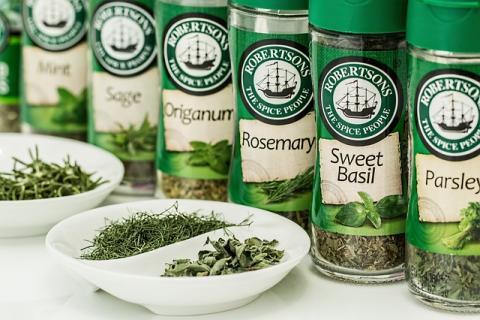
When cold and flu season strikes Chicken Noodle Soup is usually on the menu. If you look at some of the good old-fashioned, and even more modern versions, you will see these 4 herbs. Parsley, Sage, Rosemary, and Thyme are all very well-known herbs used for holistic and ancient healing. Each of the herbs contains healing benefits on top of great taste. If you don’t already have these 4 herbs in your arsenal – whether it is the kitchen cabinet or the medicine cabinet – I suggest you add them! These aromatic herbs are wonderful for aromatherapy too.
Parsley ( Petroselinum crispum) – Believe it or not this culinary herb is much more than the garnish on your plate. This biennial plant makes its way into the garden year after year once it’s firmly planted its roots. Parsley seed tea works as a diuretic by blocking the re-absorption of sodium and potassium – causing more water to flow, which allows more urine to pass. This tiny plant is packed full of vitamins, minerals, and antioxidants. It is really good for building and maintaining our immune system.
There was some research done in a University in Istanbul, Turkey on the anti-diabetic properties found in parsley and the results provided proof to back the folklore behind the medicine. There are compounds found within parsley that help naturally decrease blood-sugar levels in the body. The plant also contains anti-inflammatory properties which makes it wonderful for arthritis. These properties specifically reduce internal inflammation within the body and come from the vitamin C and Beta-carotene.
Sage ( Salvia officianalis – Sage is a wonderful plant from any aspect you look at it. It contains multiple physical healing properties, as well as, emotional and mental healing properties. Sage is considered to be a sacred medicine in Native and Indigenous beliefs. It plays a big roll in stopping memory loss and concentration. Any way you look at it sage is a plant worth growing in your garden.
Rosemary (Rosmarinus officianalis) – This plant is well-known in the culinary sphere all over the world. It is also used medicinally all throughout. Similar to parsley, rosemary is packed with antioxidants and rosemary essential oil is known to have antibacterial properties which makes it wonderful for the cold and flu season. The essential oil of rosemary is not only good for a cold but it will also help ease pain in achy muscles and joints.
A few drops of this oil used for aromatherapy help concentration and memory. I tried it for myself and I was amazed at the results. You can even take some dried rosemary and crush it between your fingers and inhale deeply – the effects are similar to the essential oil.
Thyme (Thymus vulgaris) – Thyme is a wonderful herb to have on hand when the cold or flu strikes. It is a powerful germ killer – it is one of the things in mouthwash that handles germs. It is powerful enough to take care of bacterial and fungal infections with ease. Thyme is very effective in fighting bronchitis, ear infections, sore throats, and so much more that pertains to the cold and flu. Thyme will also help reduce a cough that is caused by bronchitis or other infections or irritations that have to do with your lungs.
The next time you have a house full of people that are passing around cold, flu, and other nasty germs consider adding these 4 herbs to some of your meals. I feel as though that some of the best medicines to be had come from a nice hearty meal served with love.
For those of you who are not fans of cooking, or maybe don’t have the time, I highly suggest looking into the essential oils that you can purchase from these plants. The cold and flu germs seem to have a habit of making their way around and around the home why not fight them off in an all-natural way that is healthy all the way around? Whether it is the essential oils or the fresh or dried herbs you add to your medicine chest, I highly recommend adding Parsley, Sage, Rosemary, and Thyme to your medical arsenal this winter. Trust me, you won’t regret it!








